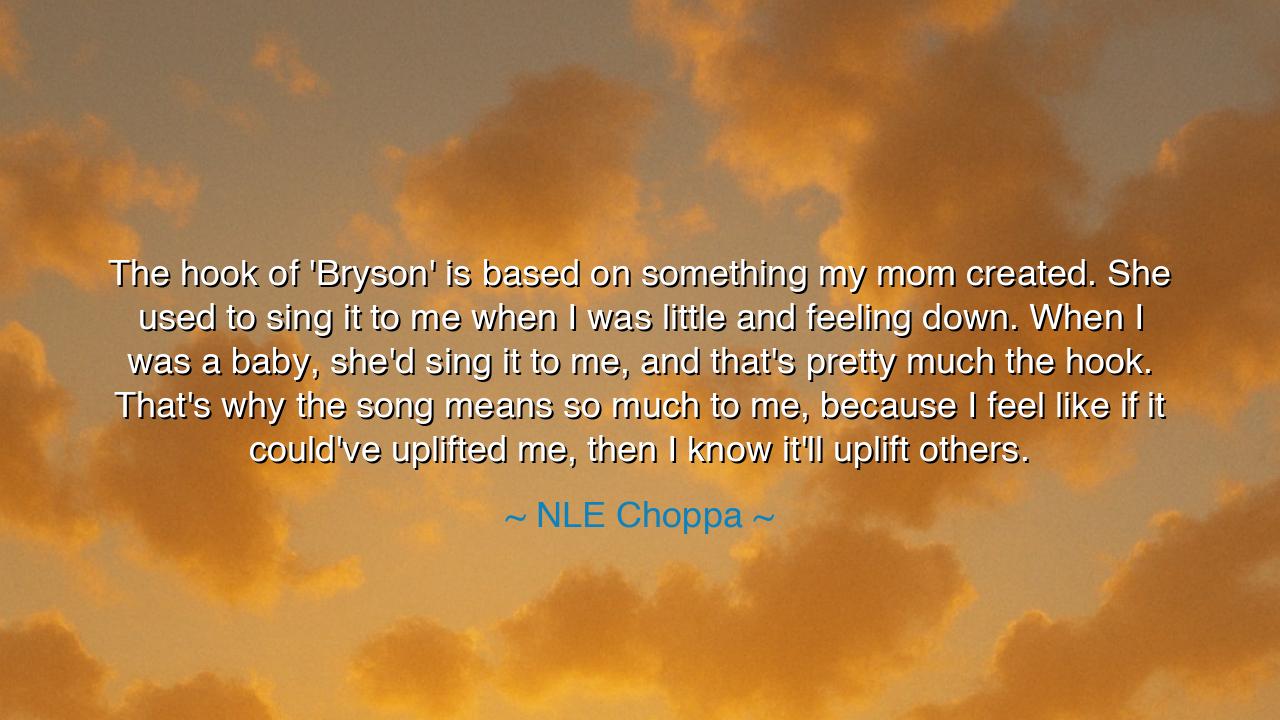
The hook of 'Bryson' is based on something my mom created. She
The hook of 'Bryson' is based on something my mom created. She used to sing it to me when I was little and feeling down. When I was a baby, she'd sing it to me, and that's pretty much the hook. That's why the song means so much to me, because I feel like if it could've uplifted me, then I know it'll uplift others.






There is a deep and sacred tenderness in the words of NLE Choppa, who said, "The hook of 'Bryson' is based on something my mom created. She used to sing it to me when I was little and feeling down. When I was a baby, she'd sing it to me, and that's pretty much the hook. That's why the song means so much to me, because I feel like if it could've uplifted me, then I know it'll uplift others." In this reflection lies the eternal heartbeat of humanity — the passing of comfort, of love, and of healing from one generation to the next. It is the voice of a son remembering the song that soothed his soul, and through his art, returning that same peace to the world.
Every ancient culture has known this truth: that a mother’s voice is the first music of life. Before a child learns words, it learns rhythm — the gentle rise and fall of its mother’s tone, the heartbeat against her chest. The origin of Choppa’s song is not found in a studio or in fame, but in that most sacred of places — the arms of a mother, holding her child through sorrow. The “hook” she created was more than melody; it was a form of prayer, a lullaby shaped from compassion. It was the song of reassurance — the promise that no darkness lasts forever.
This moment of remembrance speaks to something timeless: the power of sound to heal the human spirit. Since the dawn of civilization, people have used music as medicine. The shepherds of ancient Greece sang hymns to calm the sick. The warriors of Africa beat drums not only to march into battle but to restore courage to their weary hearts. And in every land, mothers sang — not to entertain, but to nurture. Choppa’s quote reminds us that music born from love carries a force greater than fame: it becomes a vessel of empathy.
There is also great symbolism in how the artist turns personal comfort into universal healing. By transforming the song his mother sang into a track for the world, Choppa continues the sacred cycle — the echo of love traveling from one soul to many. This is the act of the creator at its purest: to take what once healed him and use it to heal others. It is the same impulse that guided the poet who writes after heartbreak, the painter who transforms grief into beauty, the leader who, having suffered, now comforts his people. True art, as Choppa reminds us, is born not from ego, but from remembrance and gratitude.
One might recall the story of Ludwig van Beethoven, who, even as he lost his hearing, continued to compose music that uplifted millions. In his silent world, he still heard echoes — perhaps not of sound, but of love. His greatest symphonies were not written from comfort, but from the memory of something pure and eternal. Like Choppa’s “Bryson,” they were songs of survival — proof that the beauty born from pain can become light for others.
What Choppa reveals through this simple confession is the truth that healing is cyclical. The child who is once comforted grows to comfort others. The one who receives love becomes its bearer. The melody that lifted him from sadness now becomes an anthem of hope for strangers. In this way, love does not die; it multiplies. Each generation takes what it was given and transforms it, adding its own rhythm, its own truth. What began as a lullaby in a quiet room becomes a song carried across nations.
And so, the lesson, my children, is clear: never forget the songs that raised you. Whether they were sung by your mother, whispered by a friend, or spoken by your own heart in moments of pain — cherish them. These are your roots, your compass, your inheritance. Use them not only to remember where you came from, but to guide others home.
For as NLE Choppa teaches, the music that heals the heart of one can heal the hearts of many. And when we take the love that was once given to us — fragile, trembling, sung in the dark — and offer it to the world, we continue the oldest, most sacred melody of all: the song of hope, the song of connection, the song of light reborn from love.






AAdministratorAdministrator
Welcome, honored guests. Please leave a comment, we will respond soon